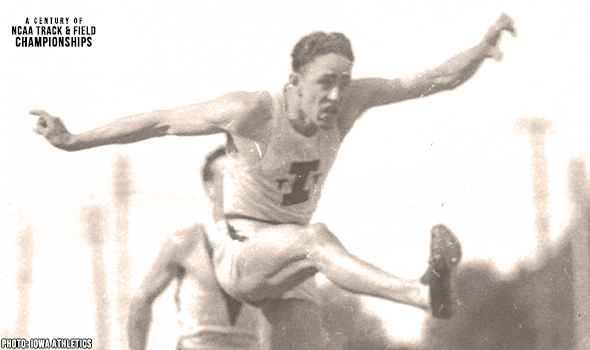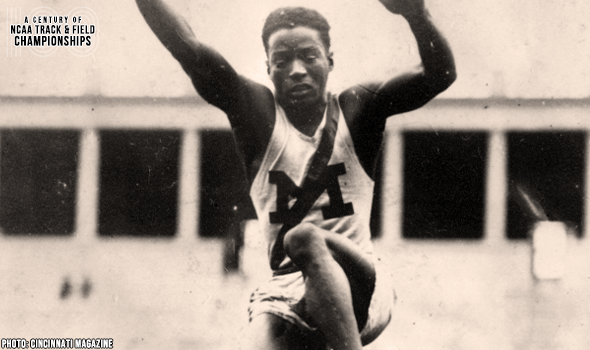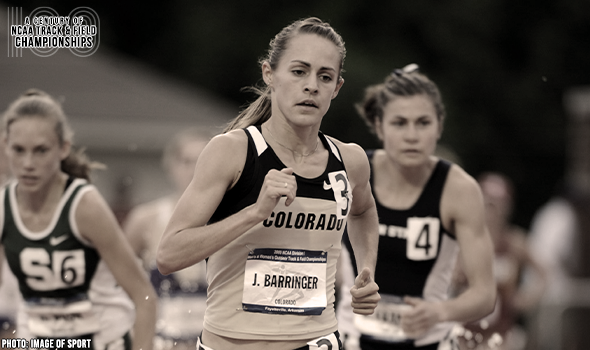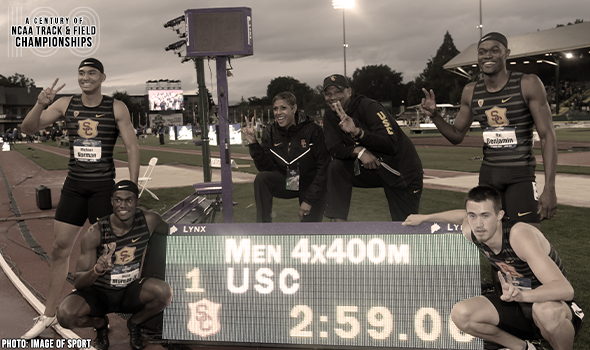
Brookins Hurdled To All-Time Marks
Charles Brookins of Iowa was one of the big stars in the 1923 NCAA Championships, the meet’s third edition held at Amos Alonzo Stagg Field in Chicago.
Brookins ran the world’s two fastest times in the 220-yard low hurdles as he was one of four athletes in the meet to repeat a victory from 1922, when as a sophomore he edged Notre Dame’s Gus Desch in a world record 24.2. Desch, who won the first NCAA 220 hurdles in 1921, had also earned Olympic bronze in the 1920 400-meter hurdles.
That neither of Brookins’ marks from the 1923 NCAA Championships – 23.9 in the heats, 23.6 in the final – was ratified as a world record shows just how much has changed in the sport in nearly 100 years.
It wasn’t just the event, but how it was contested – using the curve for the first portion of the race. The IAAF only ratified straightaway 200/220s (hurdles or sprint) until 1958, and that nearly coincided with when the 220 hurdles was being phased out of the NCAA meet (It was last held in 1959).
Brookins had in fact set ratified world records in the straightaway version – just two weeks earlier at the Big Ten (then known as the Western Conference) Championships he ran 23.2, a mark that would not be surpassed as a world record until 1935, when Jesse Owens ran 22.6 in his Day of Days, also at the Big Ten meet.
Brookins, a native of Des Moines, Iowa, who grew up about 30 miles away in Oskaloosa, won a third-straight Big Ten title in 1924, a year in which there was no NCAA meet so as not to conflict with the Olympic Trials.
He now needed a new event, though, as the 220 lows had long since been replaced on the Olympic schedule by the 400-meter hurdles – not just a longer distance but with hurdles at 36” inches instead of 30”.
Iowa suddenly became a haven for long hurdlers. Iowa coach George Bresnahan – a USTFCCCA Hall of Famer – set up a 400-meter hurdles race a couple weeks before the Trials, but the winner was Hawkeye teammate Chan Coulter, a quarter-miler who shocked in this event at 53.2 when the ratified world record was 54.0. F. Morgan Taylor from nearby Grinnell College was runner-up ahead of Brookins.
Those three made the U.S. team at the Olympic Trials, Brookins also bettering the world record in the heats and semis before losing in the final to Taylor at 52.6, with Brookins (an estimated 52.8) and Coulter following.
A month later at the Paris Olympics, Taylor earned gold while Brookins finished second but was not awarded any medal as he was disqualified for running out of his lane. Taylor’s time of 52.6 was not acceptable as a world record because he had knocked over a hurdle – a rule no longer in force.
Brookins retired from track after winning the 220 hurdles at the 1925 AAU nationals, but Taylor won the 1925 NCAA 220 hurdles and earned two more Olympic 400-meter hurdle berths, including 1932 when he was U.S. flag bearer for the opening ceremony.
The NCAA and collegiate track & field will mark a momentous milestone in the spring of 2021 -- the 100th anniversary of the NCAA Championships and with that, the NCAA Track & Field Championships. In June 1921, the University of Chicago hosted the first track & field championships in NCAA history.
This point can’t be emphasized enough: Not only was the event the first for NCAA track & field, but the first championships for any sport under the sponsorship of the NCAA.
To celebrate, over each of the next 365 days, the U.S. Track & Field and Cross Country Coaches Association (USTFCCCA) will celebrate moments, student-athletes, and coaches that have made a century’s worth of championships special. From humble beginnings to important historical milestones to the modern-day, collegiate track & field has evolved with the American society.
The 2021 edition of the NCAA Division I Outdoor Track & Field Championships begin with preliminary round action on May 27-29 in Jacksonville, Fla., and College Station, Texas. The championships final site and culmination of the celebration is slated for June 9-12, 2021 at the newly rebuilt Hayward Field in Eugene, Ore.

Oregon’s Burleson Races To Meet’s First Sub-4 Mile
ON THIS DAY: Dyrol Burleson of Oregon recorded the first sub-4 minute mile in meet history at the NCAA Outdoor Track & Field Championships. Burleson finished in 3:59.8 and used a 55.2 closing lap to seal the deal.

Nebraska’s Greene Equals 100-Yard World Record
ON THIS DAY IN 1967: Charlie Greene of Nebraska equaled the world record in the 100 yards with his time of 9.1 at the NCAA Division I Outdoor Track & Field Championships.

Twice As Nice For Texas’ Richards In 2003
ON THIS DAY: Sanya Richards of Texas became the first freshman (man or woman) to win the 400 & double back to anchor the winning 4×400 relay team.

Hubbard Makes World History At NCAAs
ON THIS DAY: DeHart Hubbard of Michigan achieved the first ratified world record ever set at the NCAA Championships in 1925.

Barringer Caps Legendary Collegiate Career
Exactly 11 years ago, Jenny Barringer of Colorado became the first woman to win the steeplechase three times in a career at the NCAA Division I Outdoor Track & Field Championships.

Villanova’s Reid Completes Historic 1500-5K Double
Sheila Reid of Villanova completed the first 1500-5K double at the same NCAA Division I Outdoor Track & Field Championships on June 11, 2011!

Brazier Makes History Two Laps At A Time
Donavan Brazier of Texas A&M set the collegiate record of 1:43.55 in the Men’s 800 Meters at the 2016 NCAA Track & Field Championships.

Wottle Leads Eight Men Under Four Minutes
On this day in 1973, Dave Wottle of Bowling Green led eight runners under the 4-minute barrier for the mile – just the second time such depth had occurred anywhere in the world.

Fight On! Southern California’s Historic Day
Three collegiate records in 80 minutes is what Southern California’s men’s team did ON THIS DAY back in 2018.

Holloway’s Texas Two-Step Into The Record Book
On this day in 2019, Grant Holloway of Florida broke Renaldo Nehemiah’s 40-year-old collegiate record in the Men’s 110 Hurdles.

